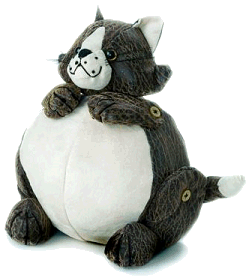 It is important to visually and physically
examine
your cat. A cat's
normal, healthy weight will
vary depending on the breed. A large, fully-grown Maine Coon may
weight 18 pounds, while a smaller Singapura may actually be overweight
at a mere 7 pounds. It is important to visually and physically
examine
your cat. A cat's
normal, healthy weight will
vary depending on the breed. A large, fully-grown Maine Coon may
weight 18 pounds, while a smaller Singapura may actually be overweight
at a mere 7 pounds. Check that your pet's ribs are easily felt but not visibly sticking out. Move your hands along the sides of the body and gently try to feel the ribs. If the cat is within range of its ideal weight, you should be able to easily count the ribs. The ribs should be covered with a layer of fat, but not to an extent that would make it difficult to feel them. Look at your pet from above. Some indentation between the rib cage and the hips, depicting an hourglass shape, indicates that your pet is at a desirable weight. Check your pet's belly. If the belly of a cat protrudes, the cat may be overweight. Feel your pet's hips. Anything more than light fleshiness indicates that your pet is above normal weight. As with humans, an overweight cat is at risk for serious health problems such as diabetes and heart conditions. Early death is a real possibility for an obese cat. You need to help your cat maintain a healthy weight.  The internet is full of great articles about how to deal with an overweight cat. Here is just one of them, from The Pet Center: OBESITY IN CATS... and What To Do About An Overweight Cat. |